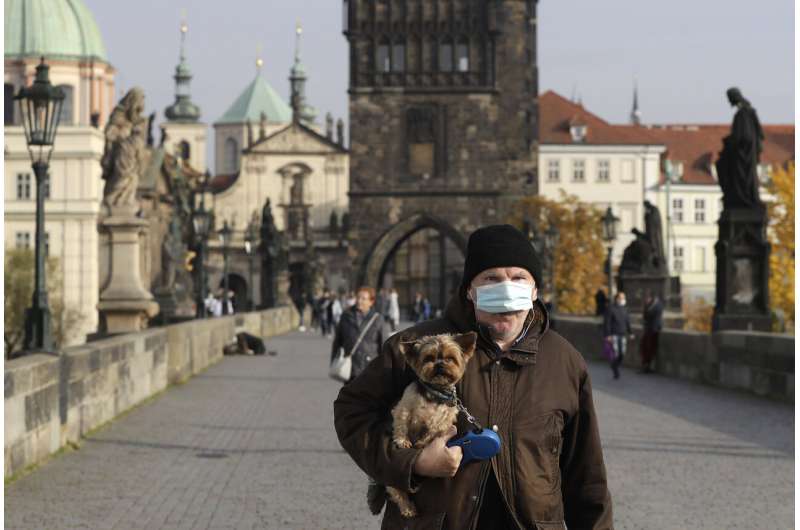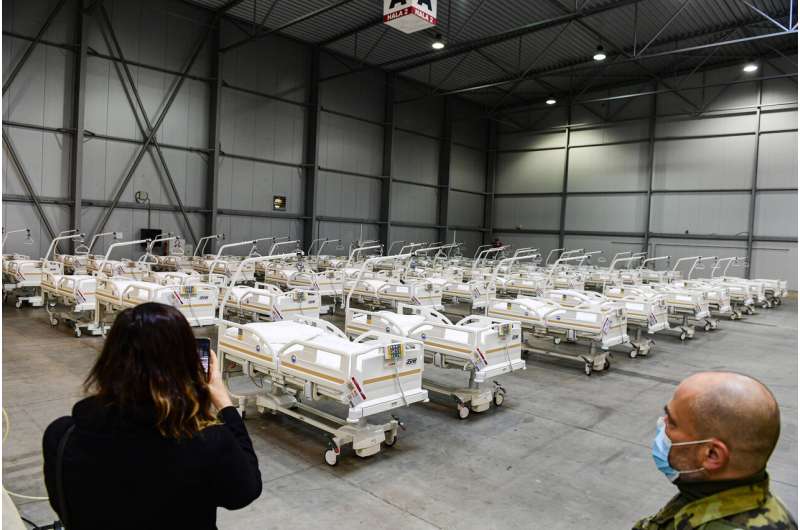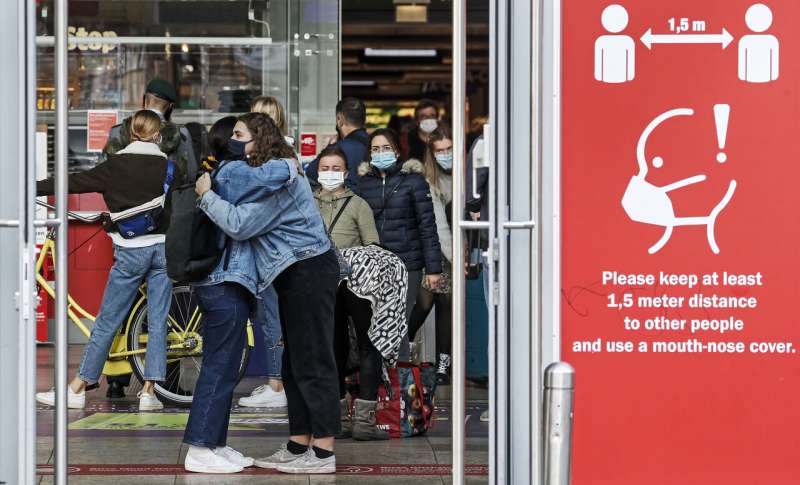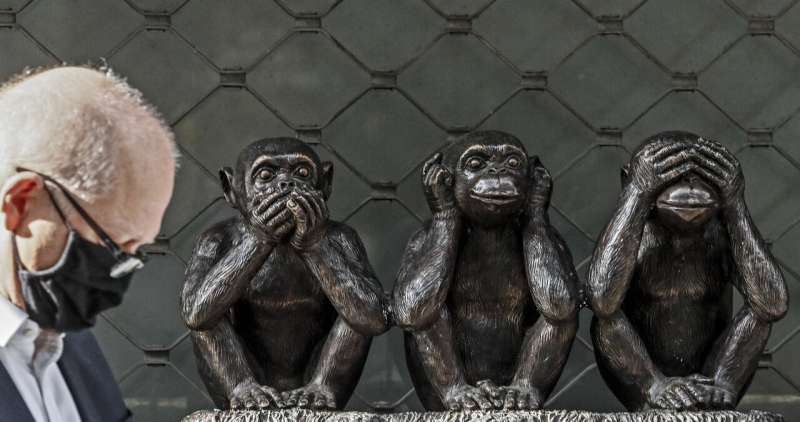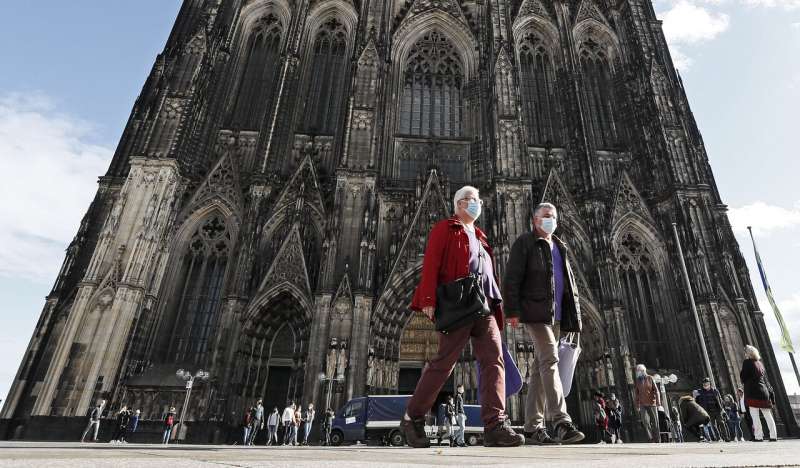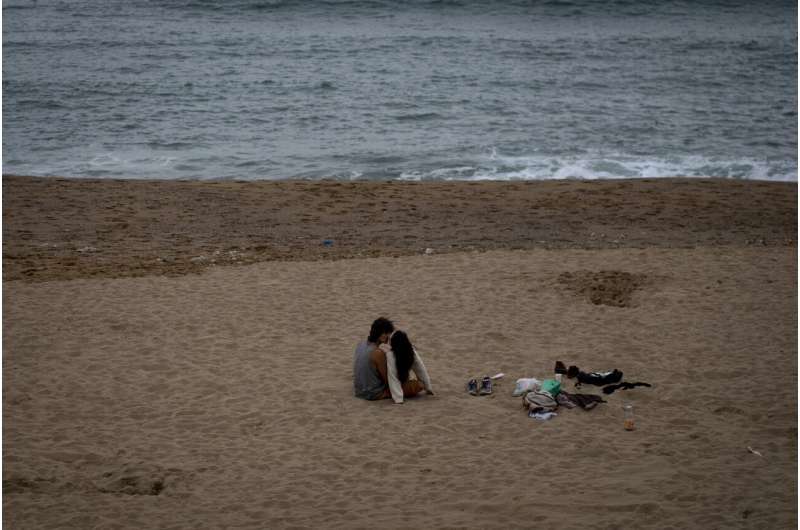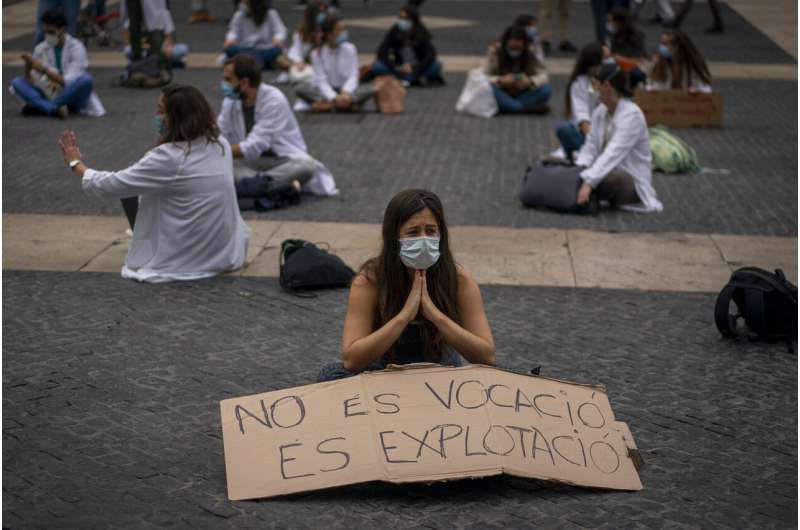A man wearing a face mask carries his dog across the medieval Charles Bridge in Prague, Czech Republic, Wednesday, Oct. 21, 2020. In another desperate attempt to slow the rise of coronavirus infections in the Czech Republic, Health Minister Roman Prymula has announced a ban on free movement of people in the country and a closure of many stores, shopping malls and hotels. At the same time, state offices will limit their opening hours. Prime Minister Andrej Babis says those measures should prevent the collapse of the health system in early November. (AP Photo/Petr David Josek)
Italy's three largest cities and dozens of regions of France face curfews as authorities try to slow the spread of the coronavirus in Europe, where most countries are now imposing or mulling new restrictions on activity in response to rapidly rising caseloads.
A midnight-to-5 a.m. curfew in Italy's Lazio region, which includes Rome, begins on Friday and lasts for 30 days, under an order signed Thursday by regional governor Nicola Zingaretti. He was seriously sickened with COVID-19 when Italy became the first European country overwhelmed by an outbreak early in the pandemic.
The governor of Campania, the southern region which includes densely populated Naples, on Thursday ordered residents to stay at home from 11 p.m. to shortly before dawn starting the next day. A similar curfew in Lombardy, where infections are particularly surging in its main city, Milan, will go into effect Thursday night.
Disco operators staged a protest in Rome on Thursday to highlight the economic woes the late night curfews will deal them.
Greece will impose a 12:30 a.m. to 5 a.m. curfew in greater Athens and other areas with high infection rates.
"The aim is to reduce general movement and evening gatherings, which favor the transmission of the virus," Prime Minister Kyriakos Mitsotakis said in a televised address. "With a little less fun, for a short period of time, we will have better health for a long time."
A journalist takes a picture of beds prepared in a field hospital, which will function as a backup device for patients with coronavirus, in the Letnany neighbourhood at the Prague outskirts, Czech Republic, Thursday, Oct. 22, 2020. (AP Photo via CTK/Roman Vondrous) SLOVAKIA OUT
Greece has seen a surge in infections in recent weeks, tied to the summer holiday season, and on Thursday reported 882 new confirmed cases, a record, and 15 deaths. The country will also require mask use outdoors in areas of high transmission.
Italy was Europe's first country to be put under a national lockdown in March. But so far Premier Giuseppe Conte, wary of crippling the country's long-lame economy, hasn't repeated the drastic move—even as daily new confirmed infections hit a record of more than 16,000 on Thursday. Instead, for now, Conte has urged Italians to avoid "unnecessary" movements.
But the Czech Republic's government on Thursday re-imposed exactly the same heavy restrictions it slapped on citizens in the spring—and which Prime Minister Andrej Babis had repeatedly said would not be repeated—amid a record rise in infections.
An apologetic Babis said that without the restrictions the nation's health system would collapse in early November. The measures include limits on free movement and the closure of many stores, shopping malls and hotels, until at least Nov 3.
People are ordered to wear face masks and keep distance due to the coronavirus pandemic in Cologne, Germany, Thursday, Oct. 22, 2020. The city exceeded the important warning level of 50 new infections per 100,000 inhabitants in seven days. More and more German cities become official high risk corona hotspots with travel restrictions within Germany. (AP Photo/Martin Meissner)
Curfews were vastly extended in France, where Prime Minister Jean Castex said the restriction ordered last week in eight regions, including Paris and its suburbs, will be applied, starting Friday at midnight, to 38 regions plus Polynesia.
Poland broke another record in confirmed new infections Thursday with more than 12,100, and registered nearly 170 new deaths.
Prime Minister Mateusz Morawiecki suggested that, starting Saturday, Poland might be placed under tighter restrictions such as mandatory use of masks in all open public spaces, limits on the number of customers in shops and on public transport, and closing gyms and swimming pools.
Germany also reported a new daily record of more than 10,000 infections Thursday, shattering the previous high of 7,830 set five days earlier. Health Minister Jens Spahn, who tested positive for COVID-19 on Wednesday, was quarantined at home.
A man wears a mandatory face mask as he passes three monkey figures at a shopping street in Cologne, Germany, Thursday, Oct. 22, 2020. The city exceeded the important warning level of 50 new infections per 100,000 inhabitants in seven days. More and more German cities become official high risk corona hotspots with travel restrictions within Germany. (AP Photo/Martin Meissner)
Denmark also notched its highest one-day caseload of COVID-19 infections, 760.
Portugal is banning people from traveling between counties on the Oct. 31-Nov. 2 Halloween and All Saints' Day weekend. The move is aimed at discouraging family gatherings, which are blamed for most of the country's new infections.
Health Minister Marta Temido said she expected the daily tally to keep climbing in coming days. Portugal posted a new record of officially reported daily infections of 3,270 cases.
In Belgium, Foreign Minister Sophie Wilmes, who as prime minister led the country's fight against the coronavirus earlier in the outbreak, has been hospitalized in intensive care with COVID-19, her office said Thursday. Foreign Ministry spokeswoman Elke Pattyn told The Associated Press that Wilmes is conscious and her condition "is not worrying."
People are ordered to wear face masks in front of the famous Cathedral in Cologne, Germany, Thursday, Oct. 22, 2020. The city exceeded the important warning level of 50 new infections per 100,000 inhabitants in seven days. More and more German cities become official high risk corona hotspots with travel restrictions within Germany. (AP Photo/Martin Meissner)
With more than 1 million accumulated coronavirus infections, Spain mulled possible curfews.
"It is a reality that in some parts of our country, the epidemic is out of control," Health Minister Salvador Illa told Spain's Onda Cero radio.
With a 14-day rate of infection over 1,000 cases per 100,000 residents, more than three times the national average, the northern Navarra region has ordered all bars and restaurants closed and for shops and businesses to open only until 9 p.m. It also banned non-essential travel in and out of its regional borders.
Madrid, which for weeks was the hottest pandemic spot in Europe, has been under similar measures for nearly two weeks. And although it has seen a recent stabilization of contagion, Illa said more needed to be done there.
British Prime Minister Boris Johnson introduced a three-tier alert system last week for England. In Wales, a two-week "firebreak" lockdown starting Friday will shutter all non-essential shops and ban most trips outside home.
-
A couple kiss on a beach in Barcelona, Spain, Thursday, Oct. 22, 2020. Spain has reported 1 million confirmed infections—the highest number in Western Europe—and at least 34,000 deaths from COVID-19, although experts say the number is much higher since many cases were missed because of testing shortages and other problems. (AP Photo/Emilio Morenatti)
-
Medical residents take part on a protest against their working conditions during a strike in Barcelona, Spain, Thursday, Oct. 22, 2020. Spain has reported 1 million confirmed infections—the highest number in Western Europe—and at least 34,000 deaths from COVID-19, although experts say the number is much higher since many cases were missed because of testing shortages and other problems. Banner reads in Spanish: "it is not a vocation but exploitation". (AP Photo/Emilio Morenatti)
Ireland's Prime Minister Michael Martin has announced that for the next six weeks all non-essential shops must close, restaurants can only offer takeout, and people must not travel further than 5 kilometers (3 miles) from their homes. Schools will stay open.
Cyprus made mask wearing mandatory for anyone older than 12 in outdoor public spaces after daily infections hit record numbers in the last two weeks.
© 2020 The Associated Press. All rights reserved. This material may not be published, broadcast, rewritten or redistributed without permission.
